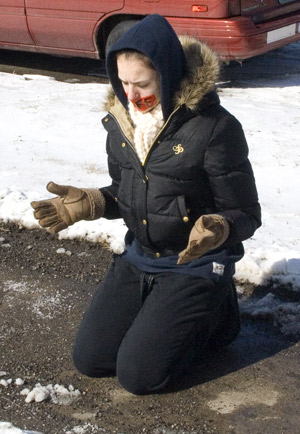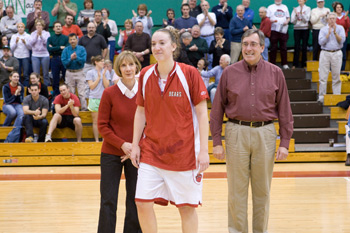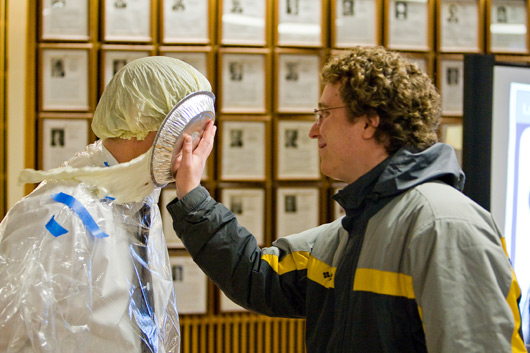
Scott Bressler
As a woman steps out of the Hope Clinic, Bill Gover implores her, “When you’re crying at night, don’t turn to the booze or the drugs. Turn to Jesus Christ.” The Illinois center provides abortions, and Gover is one of many protesters who come out every Saturday morning to demonstrate against the facility. He carries a large green and white “Jesus” sign and follows patients as they walk from their cars to the door of the clinic.
Alongside the protesters, another group of people waits for patients to arrive. They are volunteer escorts, and their job is to get women who seek abortions at the clinic past the protesters safely and comfortably. Many of these volunteer escorts are Wash. U. students.
The anti-abortion protesters have many colorful names for the volunteers.
“They call us murderers and deathscorts,” says Hallie Marin, a senior who escorts at Hope Clinic. “They ask us why we hate little children.”
Student volunteers have experienced harrowing episodes of protesters following them, yelling at them, calling out insults and even trying to block their passage. Some of the protesters take pictures of clinic workers and volunteers and post them online so they can be identified easily. Senior Becca Widzer, co-president of Students for Choice and a three-year escort, has been posted on such a site, though she says nothing came of it.
Widzer still remembers one protester’s sign that caught her attention when she first started volunteering. “It said ‘Abortion is the Next Holocaust,'” Widzer said. “It shocked me, and I thought, ‘How dare you!'”
This past Saturday morning-at a time when protesters are typically out in force-Hope Clinic was relatively quiet and only a handful of demonstrators were out talking to the patients. One group merely stood by the door praying silently, with red tape over their mouths with the word “LIFE” written across it. A seminarian led one group of Catholics in praying the rosary.
“We hope that the last thing that baby hears is a prayer,” said demonstrator Joe Schmidt.
“It is a baby. It has fingernails, a beating heart,” said seminarian Brian Alford. “We’ll find an adoptive home or refer them to Project Rachel.”
Project Rachel is a Catholic ministry which helps young, unwed and struggling mothers. Women are encouraged to go to them even after an abortion for counseling.
This calm Saturday morning of fairly quiet protests was atypical, according to student volunteers and Debra Knox Diedermann, the Missouri clinic escort program coordinator for the national organization NARAL Pro-Choice America. Diedermann is also a counselor at Hope and trains new escorts at Wash. U. through Students for Choice.
“I often see patients bawling because they’ve been so brutalized by protesters,” she told new volunteers at a recent training session.
Diedermann says that St. Louis has a particularly violent history of pro-life and pro-choice clashes. A clinic doctor in the area was kidnapped years ago by protesters, and some demonstrators were known to enter clinics and lie down on the floor during the 1980s. Legislature has been passed to restrict the areas where protesters may demonstrate.
Demonstrators today use a variety of methods in their protests. John Bailiff hands out tiny plastic fetuses to women entering the Hope Clinic. He also reads from an annotated and heavily worn Bible. Bailiff said he started protesting on Sept. 8, 2001, and he feels a certain symbolism in the timing. He will tell you that after 40 million U.S. abortions were performed, 9/11 happened, followed by Hurricane Katrina. Last Saturday, he wondered aloud what will happen once 50 million abortions have been performed.
“We’re dealing with spiritual warfare here,” Bailiff proclaimed. “When you shed innocent blood, it brings the wrath of the Lord on the nation.”
Gover agreed, saying that women have become desensitized to abortion during the time he has demonstrated.
“I see very few tears now. It’s like getting a tooth pulled.” Gover and other protesters will sometimes call out to the escorts as well as the patients. “The wicked walk hand-in-hand!” he yelled.
At volunteer training, escorts are repeatedly told not to speak to or even look at the demonstrators. They are also warned not to use each others’ names at the clinics. Widzer and Diedermann agree that demonstrators will constantly goad an escort whose name they know.
The escorts are also trained to interact with women facing a variety of emotions, from fear to anger to denial. They are told to try to keep the women and their companions talking about mundane things like the weather so as not to upset them while trying to tune out the demonstrators. Additionally, the escorts are taught to try to dissuade patients from speaking with the demonstrators. They place themselves physically between the patients and the approaching protesters, who often give out the plastic babies, bibles and graphic fliers.
In escort training, Diedermann tells the prospective escorts to expect some morbid signs and handouts. This past Saturday, one man did try to give women fliers with photos of dead, dismembered fetuses; other demonstrators tell patients about a fetus’ stages of development. Diedermann says that the fetuses on the handouts are frequently stillborns, not aborted babies. She tells prospective escorts that if a woman asks them if the demonstrators are telling the truth, their response should be, “They can say whatever they want.”
Wash. U. students volunteer in other ways at local clinics as well. Senior Stephanie Sibilia works as a counselor at Planned Parenthood. “My role is to make sure that they understand the procedure and ensure that this is their decision,” said Sibilia. “I like to be a comfort, someone they can talk to without being judged.” But she warns against romanticizing her position, adding, “The clinics are not happy places. There is no sense of relief.”
The guidebook provided for escorts in training suggests that students “debrief” after a few hours of escorting by talking to a sympathetic friend or getting coffee with other volunteers. Escorts say volunteering can be exhausting and emotionally draining, and some volunteers find that close friends and family members sometimes do not support their volunteering.
Sibilia also found herself in a tricky situation with her own mother, who is a pro-life Catholic.
“Initially, my mother was completely against it,” said Sibilia. “We didn’t talk about it for the first year.” She says that since then, they have opened up communication and, though neither has converted the other, they better understand one another.
Diedermann herself was raised Catholic. She says that when she hears peaceful protesters pray the Hail Mary or Our Father, it is actually a source of comfort for her.
Two-year escort and Wash. U. junior Alyssa Pagliere said that there needs to be dialogue between pro-lifers and pro-choicers.
“I have friends who are actively pro-life, and I think that it’s good to have open discussion,” said Pagliere. “I don’t feel the need to be aggressive about it.”
 Scott Bressler
Scott Bressler Scott Bressler
Scott Bressler Scott Bressler
Scott Bressler Courtesy of Ryan Hwang
Courtesy of Ryan Hwang